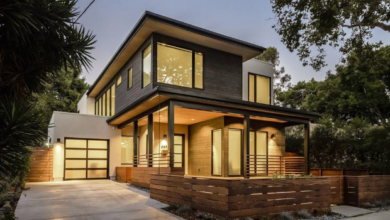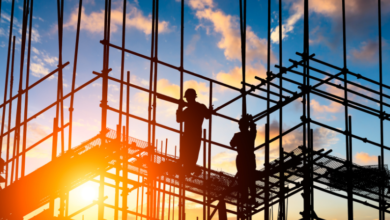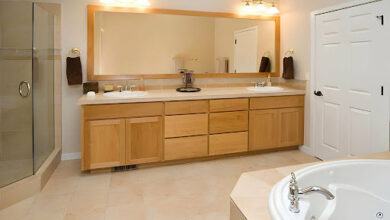Bmc building materials & construction solutions

BMC (Building Materials Corporation) is a leading provider of innovative building materials that are revolutionizing the construction industry. With a focus on maximizing efficiency and cost savings, BMC’s products are designed to meet the needs of modern construction projects. In this article, we will explore the benefits of using BMC’s building materials, how they maximize efficiency, the cost savings they offer, their sustainability and environmental benefits, the types of materials available, successful case studies, the future of BMC’s building materials in the industry, and a comparison with traditional building materials.
Benefits of Using BMC’s Building Materials
One of the key benefits of using BMC’s building materials is their durability and longevity. These materials are designed to withstand the test of time, ensuring that the structures built with them will last for years to come. This not only saves money on maintenance and repairs but also provides peace of mind to homeowners and building owners.
Another advantage of BMC’s building materials is their energy efficiency. These materials are designed to provide excellent insulation, reducing the need for heating and cooling. This not only saves money on utility bills but also reduces the environmental impact of the building by minimizing energy consumption.
In addition to durability and energy efficiency, BMC’s building materials also offer reduced maintenance costs. These materials are designed to be low maintenance, requiring minimal upkeep over their lifespan. This saves both time and money for homeowners and building owners.
Furthermore, BMC’s building materials contribute to improved indoor air quality. These materials are designed to be non-toxic and free from harmful chemicals, ensuring that the air inside the building is clean and healthy. This is particularly important for residential buildings where occupants spend a significant amount of time indoors.
How BMC’s Building Materials Maximize Efficiency
BMC’s building materials are designed to maximize efficiency in several ways. Firstly, these materials are lightweight and easy to install. This reduces the amount of time and labor required for installation, saving both time and money. Additionally, the lightweight nature of these materials also reduces the load on the building’s structure, allowing for more efficient design and construction.
Another way BMC’s building materials maximize efficiency is through their customizability. These materials can be tailored to fit specific project needs, allowing for greater flexibility in design and construction. This ensures that the building materials are optimized for the specific requirements of each project, resulting in a more efficient and cost-effective solution.
Furthermore, BMC’s building materials also contribute to reduced waste and labor costs. These materials are designed to minimize waste during the manufacturing process, resulting in less material being discarded. Additionally, the lightweight nature of these materials also reduces the amount of labor required for installation, further reducing costs.
Cost Savings with BMC’s Building Materials
One of the key advantages of using BMC’s building materials is the cost savings they offer. Firstly, these materials are generally lower in cost compared to traditional building materials. This is due to the efficient manufacturing processes used by BMC, which allows them to produce high-quality materials at a lower cost.
In addition to lower material costs, BMC’s building materials also contribute to reduced labor costs. As mentioned earlier, these materials are lightweight and easy to install, reducing the amount of time and labor required for installation. This saves both time and money for contractors and builders.
Furthermore, BMC’s building materials also offer increased energy efficiency, which leads to lower utility bills. By providing excellent insulation, these materials reduce the need for heating and cooling, resulting in significant energy savings over time. This not only saves money for homeowners and building owners but also reduces the environmental impact of the building.
Sustainability and Environmental Benefits of BMC’s Building Materials
BMC’s building materials are designed with sustainability in mind. These materials are made from recycled materials, reducing the demand for virgin resources and minimizing waste. By using recycled materials, BMC is able to reduce their carbon footprint and contribute to a more sustainable construction industry.
Furthermore, the use of BMC’s building materials also results in a reduced carbon footprint during the construction process. These materials are designed to be lightweight, reducing the amount of energy required for transportation and installation. Additionally, the efficient manufacturing processes used by BMC also contribute to a lower carbon footprint.
Moreover, BMC’s building materials have the potential to contribute to LEED certification. LEED (Leadership in Energy and Environmental Design) is a widely recognized green building certification program that promotes sustainable building practices. By using BMC’s building materials, builders and contractors can earn points towards LEED certification, further demonstrating their commitment to sustainability.
Types of BMC’s Building Materials Available
BMC offers a wide range of building materials that are designed to meet the needs of various construction projects. One of their popular products is insulated concrete forms (ICFs). These forms are made from expanded polystyrene (EPS) foam and are used to create highly insulated and energy-efficient walls. ICFs offer excellent thermal performance, sound insulation, and durability.
Another type of building material offered by BMC is structural insulated panels (SIPs). SIPs are made from a layer of rigid foam insulation sandwiched between two layers of structural board. These panels provide excellent insulation and structural strength, making them ideal for walls, roofs, and floors.
BMC also offers composite materials that are made from a combination of different materials, such as wood fibers and recycled plastics. These materials offer the look and feel of traditional wood but with enhanced durability and resistance to rot and decay. Composite materials are commonly used for decking, fencing, and siding.
Additionally, BMC also provides a range of roofing and siding options that are designed to be durable, energy-efficient, and low maintenance. These options include metal roofing, fiber cement siding, and vinyl siding, among others.
Case Studies: Successful Implementation of BMC’s Building Materials
There have been numerous successful implementations of BMC’s building materials in various construction projects. One example is the construction of a residential building using BMC’s insulated concrete forms. The use of ICFs resulted in a highly energy-efficient building with excellent thermal performance. The homeowners reported significant savings on their utility bills and were pleased with the durability and low maintenance of the building.
Another case study involves the use of BMC’s structural insulated panels in the construction of a commercial building. The use of SIPs allowed for faster construction and reduced labor costs. The building also achieved LEED certification due to the energy efficiency and sustainability of the materials used.
Furthermore, there have been successful implementations of BMC’s composite materials in outdoor projects such as decking and fencing. These materials offer the look and feel of traditional wood but with enhanced durability and resistance to rot and decay. Homeowners have reported significant cost savings on maintenance and repairs, as well as improved aesthetics.
Future of BMC’s Building Materials in the Construction Industry
The future looks promising for BMC’s building materials in the construction industry. As more builders and contractors recognize the benefits and advantages of these materials, there is potential for increased adoption and use in the industry. The demand for energy-efficient and sustainable building materials is growing, and BMC is well-positioned to meet this demand.
Advancements and improvements in technology are also expected to drive the future of BMC’s building materials. As technology continues to evolve, there will be opportunities to further enhance the performance and efficiency of these materials. This will result in even greater cost savings, improved durability, and increased sustainability.
Comparison with Traditional Building Materials
When comparing BMC’s building materials with traditional options, there are several key differences to consider. Firstly, BMC’s materials are generally lower in cost compared to traditional options. This is due to the efficient manufacturing processes used by BMC, which allows them to produce high-quality materials at a lower cost.
In terms of efficiency, BMC’s building materials offer several advantages over traditional options. The lightweight nature of these materials reduces the amount of time and labor required for installation, resulting in cost savings. Additionally, the energy efficiency of BMC’s materials leads to lower utility bills, further reducing costs over time.
Furthermore, BMC’s building materials also offer sustainability benefits that traditional options may not provide. These materials are made from recycled materials, reducing the demand for virgin resources and minimizing waste. Additionally, the efficient manufacturing processes used by BMC contribute to a lower carbon footprint.
Conclusion: Why BMC’s Building Materials are the Future of Construction
In conclusion, BMC’s building materials offer numerous benefits and advantages that make them the future of construction. These materials provide durability, energy efficiency, reduced maintenance costs, and improved indoor air quality. They maximize efficiency through their lightweight nature and customizability, resulting in reduced waste and labor costs. The cost savings offered by BMC’s building materials are significant, with lower material costs, reduced labor costs, and increased energy efficiency leading to lower utility bills. Furthermore, these materials are sustainable and environmentally friendly, made from recycled materials and contributing to a reduced carbon footprint. With a wide range of building materials available, successful case studies, and the potential for increased adoption in the industry, BMC’s building materials are poised to make a significant impact on the construction industry. It is important for builders and contractors to consider efficiency and sustainability when choosing building materials, and BMC provides a solution that meets these criteria.



